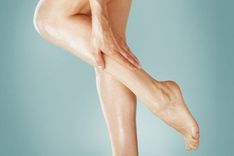You’re halfway through a high-intensity run or an extra round of weightlifting when suddenly, you feel nauseous and dizzy. You’re forced to stop, sit down, and take a break to catch your breath. Exercise-induced nausea is a common phenomenon experienced by most people, from fitness experts to beginners. So why does over-exercising cause nausea and dizziness? Read on to find out more.
1. Nausea and Dizziness During Exercise and Sports
Exercise offers numerous benefits for physical, mental, and emotional health. However, integrating workouts into daily schedules isn’t always easy. When exercising, it’s essential to reap the positive benefits while avoiding negative effects. Workouts should be done voluntarily, not forced, and only when one’s physical health is sufficient to gain the full benefits of exercise.
Nausea after exercise is a common negative effect but can often be avoided. Some days, fatigue and low energy during workouts may lead to nausea and dizziness. Other factors contributing to this condition include:

1.1. Sudden Start or Stop to Workouts
Fitness trainers often advise warming up before and cooling down after workouts to stretch muscles, adjust heart rate, prevent injuries, and reduce the risk of nausea and dizziness.
Similar to muscles and joints, internal organs can also struggle when physical activity starts or stops suddenly. Always start with gentle warm-up exercises and end with cooldown routines.
1.2. Eating Before Exercise
Nausea and dizziness during exercise can occur when blood flow is redirected from the digestive system and stomach to the working muscles, slowing digestion and causing discomfort.
If you eat within two hours before exercising, reduced blood flow to the digestive system may lead to nausea or dizziness due to dehydration and potentially more severe effects on the body. It’s widely recognized that eating right before exercise should be avoided. Foods high in fat and protein can take twice as long to digest compared to others, such as toast or bananas, making them more likely to cause nausea during exercise.
Regardless of the type of food, eating excessively before a workout is not recommended. Opting for easily digestible foods and eating at least three hours before exercising is ideal.
Additionally, drinking excessive amounts of water can dilute electrolyte concentrations in the body, leading to hyponatremia (low sodium levels), which can also cause nausea and dizziness during exercise.
In summary, experts advise against overhydrating and recommend consuming easily digestible foods several hours before starting a workout.
1.3. Type of Exercise
High-intensity or fast-paced exercises, such as running, are more likely to cause nausea than gentle workouts. Digesting food while exercising can be disrupted by vigorous activity. Consider switching to lower-intensity exercises, like elliptical training or indoor cycling, to minimize discomfort.
1.4. Exercising in Hot Temperatures
High temperatures can make us sweat easily, which can be a great way for the body to detox and leave us feeling like we've had a truly intense workout. However, it can also lead to dehydration and low blood pressure, reducing blood flow to vital organs.
In hot yoga classes, instructors often encourage students to take breaks as needed and stay well-hydrated. Similarly, if you're exercising outdoors in hot weather, remember to bring and drink water throughout your workout. Additionally, slow down to allow your body time to recover and cool down.
Alternating between these recovery periods and high-intensity intervals can transform your workout into a High-Intensity Interval Training (HIIT) session, which helps burn more calories than maintaining a steady pace throughout.
1.5. Overexertion
A common reason many people feel exhausted after working out is simply that they pushed themselves too hard when their body wasn’t ready for it. Whether you’re a beginner or accustomed to your workout routine, try to adjust the intensity to match your current capacity. This doesn’t mean you shouldn’t gradually increase the intensity of your exercises, but do so slowly and cautiously.
Consult with a doctor, trainer, or specialist about your goals. They can help you identify suitable exercises or safely increase the intensity of your workouts in a scientific manner. Pushing yourself beyond your limits can lead to various health issues, including injuries, as well as muscle and joint strain.
2. How to Prevent Dizziness and Nausea During Exercise

To prevent dizziness and nausea during exercise, trainers should try to develop some habits, such as:
During Exercise:
- Keep Your Eyes Open: While performing exercises like crunches, yoga, pilates, or weightlifting, many people close their eyes to focus. However, it’s better to keep your eyes open and focus on the horizon. This helps the body better understand movement and reduces the risk of injury.
- Breathe Slowly and Evenly During Weightlifting: Controlling your breathing can help lower blood pressure. Sudden spikes in blood pressure are a common cause of nausea and vomiting, particularly in weightlifters. Heavy lifting can drastically increase blood pressure, so it's crucial to breathe while lifting and avoid weights that are too heavy.
- Avoid Over-Bending: Taking deep breaths and bending forward can impact the stomach, leading to nausea. Opt for squatting instead of bending forward when necessary.
- Reduce Workout Intensity: If your heart rate reaches its maximum level, consider lowering your workout intensity. Overexertion often leads to dizziness, nausea, or even vomiting. Prevent this by gradually increasing your exercises to maintain a heart rate between 70-85% of your maximum.
Diet and Hydration Habits:
- Drink Water Regularly: Hydrate frequently to replace water lost during exercise. Dehydration is a common issue for those who work out, leading to symptoms like dry mouth, muscle weakness, dizziness, and headaches. Drink at least 2 cups (473 ml) of water 1-2 hours before exercising and another 2 cups 20-30 minutes before starting. During exercise, sip 1/2 cup (118 ml) every 15 minutes.
- Avoid Drinking Too Much Water at Once: Although drinking a lot of water can provide temporary relief, overhydration may trigger nausea as the body reacts to an overly full stomach. Instead, drink small, regular sips.
- Eat 1-2 Hours Before Exercise: One major cause of dizziness and nausea is low blood sugar. To avoid this, consume a meal with at least 300 calories, including protein and carbohydrates, a few hours before working out. If this isn’t possible, have a light snack, like a banana, and drink a protein shake afterward.
- Avoid Exercising Immediately After Eating: Allow your digestive system time to work effectively before exercising. Otherwise, essential fluids will be redirected from muscles to aid digestion.
- Use Sports Drinks When Prone to Low Blood Sugar: Drinks like Gatorade can help stabilize blood sugar levels during exercise, providing hydration and energy.
- Avoid Carbonated Drinks: Carbonation or shaking water bottles can increase stomach gas. Drinking from a glass instead of a bottle may help reduce gas intake.
Positive Approach to Exercise:
Most people feel refreshed after exercising due to endorphins signaling accomplishment and progress toward fitness goals. However, when negative reactions like nausea occur, they may dampen your motivation. A sudden halt in exercise routines can affect focus, happiness, and sleep quality.
For those who frequently feel nauseous during or after workouts, it may be due to a combination of factors. Keep the tips above in mind to minimize dizziness and nausea and enjoy a more comfortable and effective workout session.
Please dial HOTLINE for more information or register for an appointment HERE. Download MyVinmec app to make appointments faster and to manage your bookings easily.













